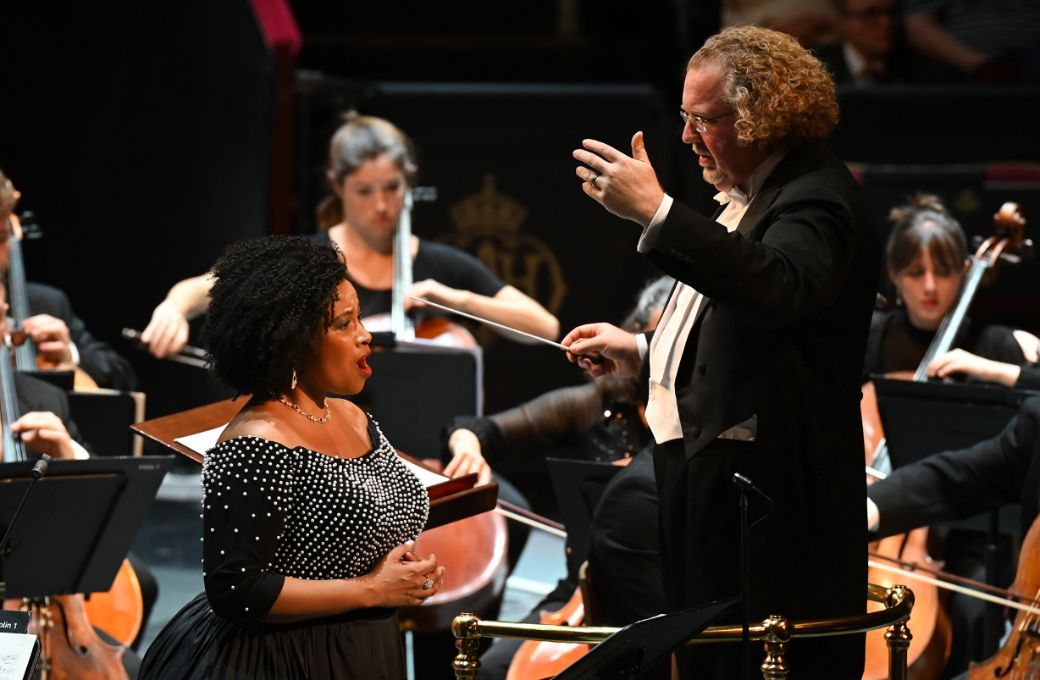It seemed like luxury casting gone mad to hire Golda Schultz for a paltry couple of Pie Jesu settings but the reality proved otherwise. This magnificent evening of French music was gilded by the South African soprano’s glorious timbre and brief, meditative interpretations. While the Requiem by Fauré will often turn to a boy treble at this point, changing the moment into a kind of trou normand midway through a hearty feast of rich harmonies and melodic sweetness, Schultz made it the music’s centrepiece, closer to an operatic lullaby than a simple prayer.

It was, moreover, all of a piece with Stéphane Denève’s spacious way with Fauré’s most expansive version of his Requiem, the one for large chorus and symphony orchestra that held general sway until relatively recently. If the chamber-sized version has superseded it nowadays, it is still a fine experience to hear this score in all its heavenly lengths, widths and depths. The French conductor took to heart the composer’s ready ownership of it as “Death’s cradle song”, a critical sneer that, he said, precisely captured his intention as he saw death as “a joyful delivery, a yearning for the happiness of the beyond”. Thus the conductor’s default dynamic choice was ppp, and the BBC Symphony Chorus drew on its intimate familiarity with the Royal Albert Hall to sing like a whispered diamond. Its massed ranks had been magnificently prepared for this concert by Grace Rossiter who deservedly won wild applause at the concert’s end; indeed, within the first two minutes the voices had emerged almost eerily as a single entity, and there was only ever one ‘t’ on luceat.
Jacques Imbrailo was a late replacement as the baritone soloist but he sang with beauty and dignity in a hushed tone that nonetheless filled the hall with effortless ease. His phrasing in the Libera me was exquisite. If there can be any criticism of Denève’s reading (and it is carping) it’s that the quietness and silences were almost too all-embracing. It’s telling that the most dramatic aspect of the performance was Richard Pearce’s preference for uneasy organ registrations in the Agnus Dei.
Schultz had opened the concert with the first of two short works by Lili Boulanger. Her Pie Jesu was the final composition before her tragic death at 24, and its four-minute score combines a flowing melody with a chromatic edge that lends it less by way of repose than at first appears. It moves the listener because, despite a rocking rhythm, the brief setting has no certainty and therefore little complacency about the death its composer imminently faced. Schultz captured its emotional heart beautifully.
At seven minutes, Boulanger’s Vieille Prière bouddhique is slightly longer but no less affecting than its companion. It is a more public work that shows what a command she had of choral and orchestral colorations: it began like a distant evocation of desert nomads, yet five minutes later it had fully earned its right to a grand climax. Tenor Laurence Kilsby delivered his contribution with grace and beauty.
The RAH was just the place to hear the Daphnis et Chloé Second Suite, complete with chorus locked deep within the musical texture rather than apart from it, and from Ravel’s opening flute bubbles to its rousing conclusion Denève gave the music ample houseroom. The BBC SO, on resplendent form all evening, contributed some divine woodwind playing, not least in its Debussy-like flute solo.
Another suite, Fauré’s for Pelléas et Mélisande, has a typical trait of opening on the dominant and spreading outwards from there, and it could almost be a continuation of the Requiem, dynamically if not thematically. Its four movements include the popular Sicilienne, a lilting earworm, plus a curious evocation of Mélisande’s death that opens with a stately death march. Not quite what Maeterlinck had in mind, but undeniably striking.


